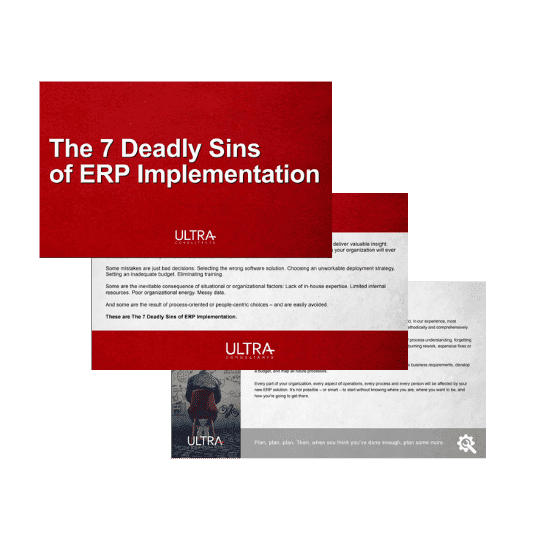#7: Neglecting Change Management
A poorly planned enterprise resource planning (ERP) change management process is perhaps the most avoidable cause of project problems and failure. Resistance to change, even positive change, is normal and expected human behavior—so, plans must be made to minimize its impact. Read on for ERP change management best practices.
Ultimately, the key to an effective change management strategy is communicating project scope, rollout strategy and schedule and most importantly, clearly and persuasively articulating the case for change. Then repeat and reinforce this messaging to ensure all levels of your organization stay focused on the benefits that will come with the future state—and not on the disruptions and uncomfortable changes that come with an organizational transformation to a new ERP system.
Analyze the impact of every change, and communicate often. Ensure every person at every level of the company understands why it is vital to remake processes and implement an ERP solution.
In any organization, change is inevitable. Whether it’s the implementation of new technologies, restructuring processes or adapting to evolving market demands, change is a constant factor that your organization must navigate. When it comes to implementing an Enterprise Resource Planning (ERP) system, neglecting change management can be a costly mistake.
An ERP system helps organizations manage and integrate core business processes. These processes include finance and accounting, human resources, procurement, inventory and supply chain management, customer relationship management and project management.
An enterprise resource planning (ERP) change management process is the process of planning, executing and managing the changes that come with implementing an ERP system. It involves addressing the technical, organizational and human aspects of the change to ensure a successful transition.

THE 7 DEADLY SINS OF ERP IMPLEMENTATION
Some mistakes are just bad strategic or financial decisions. Some are the inevitable consequence of situational or organizational factors. These are The Seven Deadly Sins of ERP Implementation.
Understanding Change Management
Change management is not a discrete phase of an ERP project; rather, it should be integrated throughout the entire implementation. It is a set of behaviors and practices that help people successfully adapt to new systems and processes.
ERP implementations involve significant changes to your organization’s business processes, technology infrastructure and employee roles. Resistance to change is a natural human response, and an effective change management team helps minimize its impact.
Key Stakeholders in ERP Change Management
Implementing an ERP system requires the involvement and support of various key stakeholders. These stakeholders include business leaders, employees, customers, suppliers and partners. Engaging these stakeholders throughout the ERP project is vital for a successful ERP implementation.
Business leaders play a crucial role in setting the direction and providing the necessary resources for the ERP implementation project. They need to communicate a clear and compelling vision to guide the change efforts. Employees, on the other hand, are the end-users of the ERP system. Their engagement and understanding of the system are crucial for its adoption and success. Regular communication, feedback sessions and collaboration with employees help build support and commitment.
Customers, suppliers and partners are also important stakeholders in the ERP change process. Their involvement ensures that the new system aligns with their needs and requirements. Engaging them early on and addressing their concerns and expectations help build strong relationships and ensure a smoother transition.

The Importance of Change Management in ERP Implementations
Because ERP implementations are complex endeavors that require careful planning, coordination and stakeholder engagement, successful change management plays a crucial role in ensuring the success of an ERP project.
1. Minimizing Resistance
Change can be disruptive and unsettling for employees. Effective ERP change management helps address employees’ concerns, fears and uncertainties, reducing resistance to new systems and processes. By involving employees early in the process and providing them with information and support, your organization creates a sense of ownership and reduces resistance to change.
Additionally, ERP change management provides a platform for open communication, allowing employees to express their concerns and provide feedback. This helps to identify potential issues and develop strategies to address them, ensuring a smoother transition to the new ERP system.
2. Maximizing User Adoption
User adoption is critical for the success of an ERP implementation. Thoughtfully managing change leads to employees who are educated, trained and supported in using the new ERP system, leading to higher adoption rates. Comprehensive training programs, including hands-on practice and ongoing support, help employees build confidence and competence in using the system effectively.
Moreover, change management involves creating a culture that promotes learning and continuous improvement. By fostering a positive environment, your organization can encourage employees to embrace change and actively participate in the implementation process.
3. Managing Organizational Impact
ERP implementations often involve significant changes to an organization’s structure, workflows and culture. Management can help lessen the impact of these changes, ensuring a smooth transition and minimizing disruptions. By conducting a thorough assessment of the current state of your organization and identifying areas that will be affected, you can develop strategies to mitigate potential risks and challenges.
Furthermore, change management provides a framework for aligning business processes with the new ERP system. By mapping out existing processes, identifying gaps and redesigning workflows, your organization optimizes operations and leverages the full potential of the ERP system.
4. Realizing Benefits
ERP systems are implemented to achieve specific business objectives, such as improving efficiency, streamlining processes and enhancing decision-making. A successful change process helps your organization realize the full benefits of the ERP investments. By setting clear goals and key performance indicators (KPIs), your organization can measure the impact of the ERP implementation and continuously improve processes.
Moreover, successful change management in an ERP project ensures that your organization remains agile and adaptable. As business needs evolve, change management allows for ongoing adjustments and enhancements to the ERP system, enabling your organization to stay competitive in a rapidly changing environment.
Key Challenges in ERP Change Management
1. Resistance to Change
Resistance to change is a common challenge in ERP implementations. Employees are typically comfortable with existing systems and processes, making it difficult for them to embrace the new ERP system. To overcome this challenge, communicating the benefits that the new system offers, addressing concerns and providing ample training and support are crucial.
2. Communication and Stakeholder Engagement
Lack of clear and timely communication creates confusion, ambiguity and misunderstandings among employees. It is crucial to communicate the purpose, benefits and impact of the new ERP system to all internal stakeholders, including employees, managers and executives.
3. Training and Adoption
Comprehensive training programs are essential for successful ERP change management. As you support employees with ongoing training in the new system, they can acquire knowledge and skills to use the new ERP system effectively. Tailor training programs to different user groups, and include hands-on practice and ongoing support.
4. Data Migration and System Integration
Data migration and system integration can be complex and challenging processes in ERP implementations. Include change management strategies for validating and migrating data as well as ensuring seamless integration with existing systems. This minimizes disruptions and ensures data integrity throughout the implementation process.
5. Organizational Considerations
ERP implementations often require changes to an organization’s structure, roles and responsibilities. Change management should address these organizational considerations, including job redesign, performance management and cultural alignment.

Risks of Neglecting Change Management During ERP Implementation
Neglecting change management during an ERP implementation can lead to various risks and challenges. Here are some potential consequences of overlooking this important process:
1. Resistance and Low Adoption
Neglecting change management during an ERP implementation can result in resistance from employees. If employees do not understand the purpose and benefits of the new ERP system, they may resist the change and continue to rely on old processes. This can lead to low adoption rates and underutilization of the system’s capabilities. Without proper change management, your organization may fail to achieve the desired benefits and return on your ERP investment.
2. Disruptions and Productivity Loss
ERP implementations often require changes to existing processes, workflows and roles. Neglecting change management can lead to disruptions, confusion and a decline in productivity as employees struggle to adapt to the new system. Without proper training, support and communication, employees may face difficulties in understanding and using the new ERP system. This can result in inefficiencies, errors and delays in business operations.
3. Unclear Communication
Effective communication is crucial during an ERP implementation. Neglecting change management can result in unclear and inconsistent communication, leading to confusion and ambiguity among employees. If employees do not understand the purpose, benefits and impact of the new system, they may resist the change or misunderstand its implications.
4. Inadequate Training and Support
Neglecting change management during the rollout of enterprise resource planning (ERP) systems leaves employees without the proper training and ongoing continuous training support to smoothly adapt workflows and processes to the new system. This knowledge gap leads to subpar adoption, productivity losses from struggling with an unfamiliar system and frustration that can spur resistance or outright rejection of the ERP software.
ERP Change Management Best Practices
Implementing effective ERP change management practices can help your organization navigate the challenges of ERP implementations and ensure a successful outcome. Here are some ERP change management best practices to consider:
1. Define a Clear Vision and Objectives
Before embarking on an ERP implementation, it is crucial to define a clear vision and objectives for the project. This includes identifying the reasons for implementing the ERP system, aligning it with your organization’s business strategy and establishing measurable goals. A compelling vision helps communicate the purpose and benefits of the change to stakeholders.
A clear vision provides a roadmap for the ERP implementation, guiding the project team and stakeholders towards a common goal. It helps set expectations and creates a sense of urgency and excitement for the change. It also helps your organization in developing an ERP change management strategy. By clearly defining the objectives, project managers ensure that the ERP system’s functionalities and features are aligned with the organization’s needs.
2. Engage Key Stakeholders
Engaging key stakeholders throughout the ERP change process is essential for successful implementation. Key stakeholders include business leaders, employees, customers, suppliers and partners. Involving them early on and addressing their needs and concerns helps build support and commitment.
Regular communication is a key aspect of stakeholder engagement. Project managers should provide updates on the project’s progress, objectives and benefits. They should also address any concerns or questions raised by stakeholders. Transparency and open dialogue build trust and minimize resistance to change.
Feedback sessions and collaboration opportunities should be provided to allow stakeholders to contribute their valuable insights. This involvement creates a sense of ownership and empowers stakeholders to actively participate in the ERP implementation.

3. Conduct a Comprehensive Readiness Assessment
Assessing your organization’s readiness for change and identifying potential risks and challenges is critical. Conduct a thorough analysis of current processes, systems and organizational culture. This assessment helps identify gaps and areas that require attention and develop strategies to address emerging challenges.
During the readiness assessment, ERP project managers should involve key stakeholders and subject matter experts from various departments. Their input can provide valuable insights into the potential impact of the successful ERP implementation on day-to-day operations.
By conducting a comprehensive readiness assessment, project managers can identify and address any potential barriers to change. This proactive approach minimizes resistance and ensures a smoother transition to the new ERP.
4. Develop a Robust Change Management Plan
Creating a comprehensive change management plan is crucial for successful ERP implementation. The plan should outline the strategies, activities and timelines for managing change. It should include a communication strategy, training initiatives, stakeholder engagement and ongoing support mechanisms.
A strong change management team should be established to lead the implementation process. This change management team should consist of individuals with expertise in change management efforts, project management, effective communication and the ERP system. Their role is to guide stakeholders through the change process, address any challenges and ensure a smooth implementation.
Tailoring training strategies to different user groups is essential in ensuring the successful adoption of the new ERP system. Provide a variety of development programs, such as online modules, workshops and one-on-one coaching, to cater to different learning styles. This approach helps users understand the new system’s functionalities and their role in the implementation process.
5. Foster a Culture of Continuous Improvement
Managing change in ERP projects is not limited to the implementation phase but should continue beyond it. Foster a culture of continuous improvement by encouraging feedback, monitoring performance and addressing emerging challenges. Regularly review the ERP system’s effectiveness and identify areas for optimization and enhancement.
Project managers should establish mechanisms for collecting feedback from end-users and stakeholders. This feedback provides valuable insights into the system’s usability, effectiveness and areas for improvement. Addressing this feedback promptly demonstrates a commitment to continuous improvement and ensures the ERP system remains aligned with your organization’s evolving needs.
6. Provide Comprehensive Training and Ongoing Support
Having a comprehensive training program is crucial for ensuring employees understand and can effectively use the new ERP system. Offer a variety of training methods, such as online modules, workshops and one-on-one coaching, to cater to different learning styles. Establish a support team to provide ongoing assistance and address any issues that arise.
Training should not be limited to the initial implementation phase but should continue as part of your organization’s culture of continuous improvement. Regularly provide refresher training sessions and updates on system enhancements to ensure employees stay up-to-date with the ERP system’s functionalities.
Ongoing support mechanisms, such as a helpdesk or support team, should be readily available to address any technical or functional issues that arise. This support ensures a smooth transition and minimizes disruptions to daily operations.
7. Communicate Effectively and Transparently
Develop a robust communication plan that keeps stakeholders informed of the project’s progress, objectives and benefits. Regularly communicate updates, address concerns and provide opportunities for feedback. Transparency and open dialogue build trust and minimize resistance.
Project managers should use various communication channels, such as emails, newsletters and town hall meetings, to reach different stakeholder groups. The communication plan should be tailored to the needs of each audience, ensuring the information is clear, concise and relevant.
Regularly seek feedback from stakeholders, and use it to address any concerns or issues promptly. This two-way communication approach fosters a collaborative environment and ensures that stakeholders feel heard and valued throughout the ERP implementation process.
8. Monitor Progress and Evaluate Results
Regularly monitor the progress of the ERP implementation and change process, and evaluate its impact on key performance indicators. Collect feedback from stakeholders and users to identify areas for improvement, and address any issues promptly. Regular reviews and updates to the change management plan ensure the ERP system remains relevant and aligned with the organization’s evolving needs.
Monitoring progress allows project managers to identify any deviations from the plan and take corrective actions. It also provides an opportunity to celebrate milestones and achievements, boosting morale and maintaining momentum.
Evaluating the results of the ERP implementation helps identify the benefits and areas for improvement. Project managers should assess the impact on key performance indicators, such as productivity, efficiency and customer satisfaction. This evaluation provides valuable insights for future ERP projects and continuous improvement efforts.
Conclusion
Neglecting change management during an ERP implementation is a significant risk—a deadly sin—that your organization should avoid. Effectively managing the change a new ERP brings to your company ensures a smooth transition, maximizes user adoption and helps your organization realize the full benefits of your ERP investment.
By defining a clear vision, engaging stakeholders, conducting readiness assessments, providing continuous training and implementing best practices, your organization can navigate the challenges of ERP change management and ensure a successful implementation. Remember, change management is not a one-time event, but a continuous process of improvement and adaptation.
Ultra Consultants understands manufacturing and distribution industries. We leverage our exceptional ERP expertise, deep industry experience, today’s best practices and a rigorous, proven methodology to help your organization realize the benefits of modern enterprise technologies—and see real bottom-line results. Contact us today for your free discovery call.






